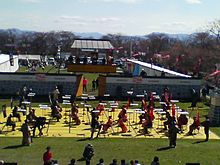
Shogi, also known as Japanese chess, is a strategy board game for two players. It is one of the most popular board games in Japan and is in the same family of games as Western chess, chaturanga, Xiangqi, Indian chess, and janggi. Shōgi means general's board game.

Cosplay, a portmanteau of "costume play", is an activity and performance art in which participants called cosplayers wear costumes and fashion accessories to represent a specific character. Cosplayers often interact to create a subculture, and a broader use of the term "cosplay" applies to any costumed role-playing in venues apart from the stage. Any entity that lends itself to dramatic interpretation may be taken up as a subject. Favorite sources include anime, cartoons, comic books, manga, television series, and video games. The term is composed of the two aforementioned counterparts – costume and role play.

A shogi variant is a game related to or derived from shogi. Many shogi variants have been developed over the centuries, ranging from some of the largest chess-type games ever played to some of the smallest. A few of these variants are still regularly played, though none are as popular as shogi itself.

Tendō is a city located in Yamagata Prefecture, Japan. As of 1 February 2020, the city had an estimated population of 61,947 in 22392 households, and a population density of 550 persons per km2. The total area of the city is 113.01 square kilometres.

A costume party or fancy dress party is a type of party, common in contemporary Western culture, in which many of the guests are dressed in costume, usually depicting a fictional or stock character, or historical figure. Such parties are popular in the United States, United Kingdom, Canada, Australia, Ireland and New Zealand, especially during Halloween.

Casshan, also known in Japan as Neo-Human Casshern, is an anime series created by Tatsunoko Productions founder Tatsuo Yoshida in 1973.
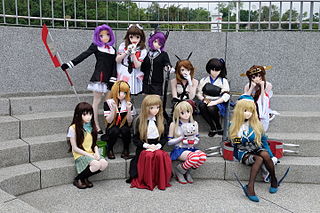
Animegao kigurumi is a type of masked cosplay that has its origins in the official stage shows of various Japanese anime but has also been adapted by hobbyists. In Japan, most performers refer to this kind of cosplay as 'kigurumi' instead of 'animegao', which has been used overseas in order to differentiate the cosplay from the onesies sharing the same name. The term 'doller' had also been used when referring to kigurumi cosplayers, but today mainly refers to BJD-styled masked cosplays. Although kigurumi remains a minor part of Japan’s cosplay scene, it began attracting overseas in North America and Europe around 2005.
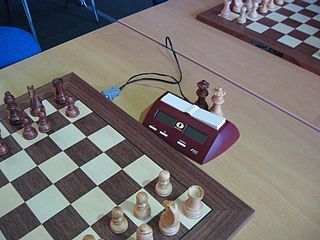
In chess, promotion is the replacement of a pawn with a new piece when the pawn is moved to its last rank. The player replaces the pawn immediately with a queen, rook, bishop, or knight of the same color. The new piece does not have to be a previously captured piece. Promotion is mandatory; the pawn cannot remain as a pawn.
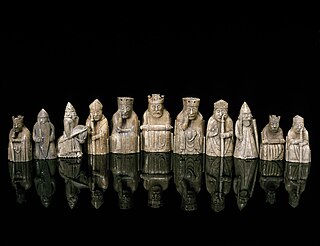
The history of chess can be traced back nearly 1500 years to its earliest known predecessor, called chaturanga, in India; its prehistory is the subject of speculation. From India it spread to Persia. Following the Arab invasion and conquest of Persia, chess was taken up by the Muslim world and subsequently spread to Europe via Spain and Italy. The game evolved roughly into its current form by about 1500 CE.
Navia Dratp is a collectible miniatures game with similarities to shogi, the Japanese equivalent of chess. See also chess variants for similar games.

Kumoricon is an annual three-day anime convention held during October or November at the Oregon Convention Center in Portland, Oregon. The name of the convention comes from the Japanese word Kumori (曇り), meaning cloudy. Kumoricon is run by a volunteer staff and was previously held in Vancouver, Washington at the Hilton Vancouver Washington/Red Lion Vancouver at the Quay.
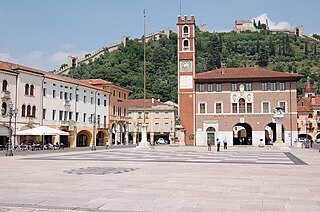
Marostica, is a town and comune in the province of Vicenza, Veneto, northern Italy. It is mostly famous for its live chess event and for the local cherry variety.

Otakuthon is Quebec's largest anime convention promoting Japanese animation (anime), Japanese graphic novels (manga), related gaming and Japanese pop-culture. It is held annually for 3 days in downtown Montreal during a weekend in August. It is a non-profit, fan-run anime convention that was initiated by Concordia University's anime club, named Otaku Anime of Concordia University. The name "Otakuthon" is a portmanteau of the Japanese word "otaku" and "marathon". Otakuthon strives to be a bilingual event, having programming, the masquerade and the program book in both official languages. The first edition of Otakuthon was held in 2006 in mid-June, but later moved to early-mid August / late July from 2007 onward. Last year's edition, Otakuthon 2019, was held on August 16–18, 2019 at the Palais des congrès de Montréal.
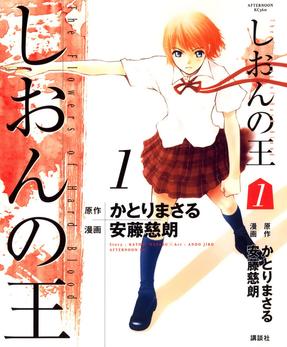
Shion no Ō, subtitled The Flowers of Hard Blood, is a Japanese manga series written by Masaru Katori and illustrated by Jiro Ando. It is published by Kodansha in the seinen manga magazine Monthly Afternoon, and is collected in eight bound volumes. It has been adapted as a twenty-two episode anime television series by Studio Deen, which aired in Japan between October 2007 and March 2008. A video game for the Nintendo DS was released on April 10, 2008, by Mainichi Communications.
The World Cosplay Summit is an annual international cosplay event, which promotes global interaction through Japanese pop culture. It developed from a cosplay exhibition held at the Aichi Expo in 2005.

Anime Milwaukee (AMKE) is an annual three-day anime convention held during February at the Wisconsin Center & Hilton Milwaukee City Center in Milwaukee, Wisconsin. It is Wisconsin's largest anime convention.
Cosplay Mania is an annual cosplay-centered convention organized by Cosplay.PH, and is usually held in the fourth quarter of the year in the Philippines. The convention features various events related to cosplay, anime, Jpop cuture features rookie and veteran cosplayers, costumers and cosplay enthusiasts. Below are the mainstay activities, some of them unique to the event:

The following outline is provided as an overview of and topical guide to chess:

Jessica Nigri is an American-New Zealand cosplayer, promotional and glamour model, YouTuber, voice actress, and fan convention interview correspondent. She has been cosplaying since 2009 and modeling since 2012, having served as an official spokesmodel for several video games and comic book series, including Lollipop Chainsaw and Assassin's Creed IV: Black Flag. She is also notable for her voice work as Cinder Fall in RWBY.

A chess variant is a game related to, derived from, or inspired by chess. Such variants can differ from chess in many different ways.



